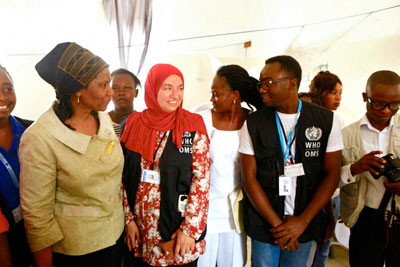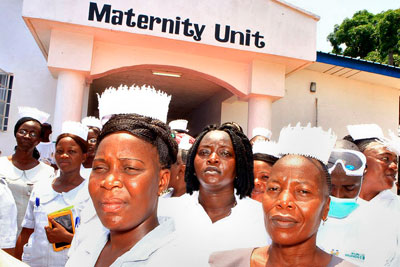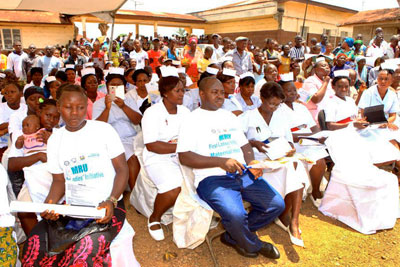Restoring confidence in the health facilities in Sierra Leone
Date:

On the last leg of her three-day visit to Sierra Leone, on 24 March UN Women Executive Director Phumzile Mlambo-Ngcuka launched the UN Women-supported Mano River Union First Ladies Initiative on Maternal and Reproductive Health Services at the Kenema District Government Hospital. The initiative aims to put essential services back on track and rebrand Maternal and Child Health (MCH) services to restore confidence in their use, eroded in the wake of Ebola Virus Disease.
Medical studies have shown that the mortality rate for pregnant women and newborn babies can be as high as 95 per cent. Fear and misinformation have hampered the gains of the free healthcare system for pregnant women and lactating mothers and related projects on primary health care, reproductive and child health, as well as prevention of mother-to-child HIV transmission in Guinea, Liberia and Sierra Leone.

Getting the Kenema Hospital into shape involved rehabilitating the infrastructure, retraining staff on infection and prevention and other key actions in line with a Protocol for Ebola Virus Infection Control, the development of which UN Women supported last year. The success of this pilot project in Sierra Leone’s Kenema District, soon to be replicated in the Port Loko District in the north, will be essential for its speedy national roll-out to all MCH centres, not only in Sierra Leone but also in Guinea and Liberia.
“We are here today because we are committed to supporting you to have a brighter future. For without you, Africa has no future,” said Ms. Mlambo-Ngcuka, upon launching the newly refurbished hospital. She urged young girls and mothers on the African continent to stay in school, finish their education and avoid signing a contract with poverty by having children at an early age and entering early marriages, identified as topmost problems in Sierra Leone’s national development agenda.
In an earlier meeting with Sierra Leone’s President Ernest Bai Koroma, the Executive Director thanked him for his effort, energy, capital and determination in in trying to quash Ebola in the country. She reassured him of UN Women’s total commitment to the Government and people of Sierra Leone and expressed deep sympathy for the loss of so many lives over the past months since the outbreak of the Ebola Virus Disease in May 2014.

“We cannot afford to lose our women and girls to Ebola as they are the mainstay of our economy,” stressed President Koroma. He told her to count on him in matters relating to gender equality and women’s empowerment and commended UN Women for its tremendous work in Sierra Leone, calling the organization a “trusted partner”.
In another meeting with the Executive Director at the Radisson Blu Hotel in Freetown, women leaders – including representatives of the judiciary, military, police, academia, civil society and government – recalled their disappointment when the initial Ebola response mechanism failed to consider women as active change agents. “It appears we didn’t learn the lessons from the war,” they emphasized. The women requested UN Women’s support to help them undertake various initiatives like “a neighbourhood watch” aimed at getting communities involved in the active monitoring of their localities both for EVD and crimes such as sexual and gender-based violence.
The Executive Director’s visit to the country from 22–24 March comes at a time when the women of Sierra Leone are demanding recognition of the critical roles that they could play to bring Ebola to a halt in their communities, as custodians of culture and tradition, and drivers of attitudinal and behavioural change.
With partners, UN Women has led multiple efforts across the country and the region to focus on integrating gender in the Ebola response and on women’s priorities since the outbreak of the disease.